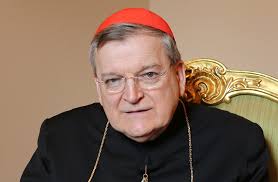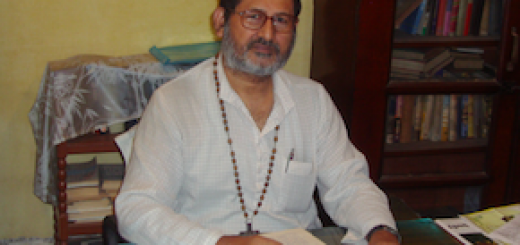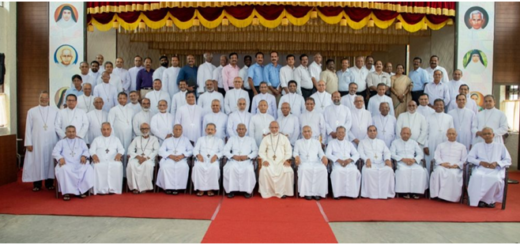BURKE MAKES ‘FINAL PLEA’ TO FRANCIS ON DUBIA QUESTIONS

Tablet, UK
14 November 2017
Burke addresses Pope Francis again on Amoris Laetitia, calls for clear expression of teaching
 (Note: This is to remind ourselves how many and how fast changes in the Catholic thinking have taken place ever since US Cardinal Burke started qauestioning the Pope one year ago. Once upon a time it was: “Rome has spoken and case is settled for good for all times.” That is what the head of the Doctrinal teaching, Cardinal Ottaviani’s motto: “Semper idem” (Always the same) used to proclaim and teach. Long gone are those days, those hopes.
(Note: This is to remind ourselves how many and how fast changes in the Catholic thinking have taken place ever since US Cardinal Burke started qauestioning the Pope one year ago. Once upon a time it was: “Rome has spoken and case is settled for good for all times.” That is what the head of the Doctrinal teaching, Cardinal Ottaviani’s motto: “Semper idem” (Always the same) used to proclaim and teach. Long gone are those days, those hopes.
Instead Cardinal Newman used to say: “To live is to change and to be perfect is to have changed more often.” That seems to have become the order of the days these days. In itself questioning is legitimate and is the sign of a healthy mind in search of truth. Burke started it first about the papal teaching “Amoris laetitia”. Then he was joined by four other cardinals under the title: “Doubts”. Two of them have died without receiving an answer. The remaining were joined by a dozen likeminded cardinals. In the face of continued silence from the Pope, a wider group of over 60 professional theologians, both lay and clerical, mostly traditionalists, took up the cause.
But Francis, being a pastoral Pope went on bearing witness to a God of mercy and compassion, ocasionally explaining that doctrinal truths of the past are not to be used as stones to throw at the the so-called “sinners” who are to be saved and not condemned. Lately the world-renowned Catholic philosopher Dr. Josef Seifert took a pot shot at Francis all by himself.
What is worse questioning the Pope has now deteriorated into rebellion and desertion by Catholic priests. They include Italian priest Alessandro Minutella from Sicily refusing to pledge obedience to Pope Francis and like minded in other countries.(Read previous posts in CCV) This last group must have patience and perseverance to continue dialogue and discussion until clarity and consensus is reached.
Former Popes, John Paul and Benedict forcefully put down dissenters, Francis in stricking contrast emphatically encourages a “paradigm shift”, diversity of opinion and practice within the Catholic community. That should not drive dissenters to cut themselves off from dialogue, from the communigy. james kottoor, editor ccv.
Cardinal Raymond Burke, who just one year ago with four other cardinals made public a number of dubia, or questions, regarding the interpretation of Pope Francis’ apostolic exhortation Amoris Laetitia, has again addressed the Pope, in what he calls a “final plea”.
Speaking to the National Catholic Register, Cardinal Burke said he wanted to emphasise “how urgent it is that, in exercising the ministry he has received from the Lord, the Pope should confirm his brothers in the faith with a clear expression of the teaching regarding both Christian morality and the meaning of the Church’s sacramental practice.”
Francis has not yet responded to the original five-question dubia, signed by Cardinal Burke, along with Cardinal Walter Brandmüller and recently deceased Cardinals Joachim Meisner and Carlo Caffarra. The cardinals sought to ascertain, among other matters, whether previous Church teaching forbidding civilly “remarried” divorcees engaging in sexual relations to receive the sacraments remained in force.
Ambiguity regarding a concrete point of the pastoral care of the family, Cardinal Burke claimed in the National Catholic Register interview, has led some to propose a “paradigm shift” regarding the Church’s entire moral practice. A process has been put into motion, he claimed, that is “subversive of essential parts of the Tradition.” Concerning Christian morality, he said, some claim that absolute moral norms need to be relativised and that a “subjective, self-referential conscience” needs to be given a kind of primacy in moral matters.
“We are speaking about whether or not a person’s encounter with Christ can, by the grace of God, give form to the path of the Christian life so that it may be in harmony with the Creator’s wise design,” he said. To understand how far-reaching the proposed changes are, he said, “it is enough to think of what would happen if this [relativising] reasoning were to be applied to other cases, such as that of a medical doctor performing abortions, of a politician belonging to a ring of corruption, of a suffering person deciding to make a request for assisted suicide.”
Asked about the Pope’s letter to the Argentine bishops, in which the bishops asked whether their guidelines that left open the possibility of some sexually active unmarried couples receiving Communion were acceptable, Burke said the Pope’s letter to the bishops, written shortly before receiving the dubia and containing comments on the bishops’ pastoral guidelines, could not be considered an adequate response to the questions posed.
“On the one hand, these guidelines can be interpreted in different ways; on the other, it is not clear that this letter is a magisterial text, in which the Pope intended to speak to the universal Church as the Successor of Peter,” he said. “The fact that the letter first became known because it had been leaked to the press — and was only later made public by the Holy See — raises a reasonable doubt about the Holy Father’s intention to direct it to the universal Church.
In addition, it would turn out to be quite astonishing — and contrary to Pope Francis’ explicitly formulated desire to leave the concrete application of Amoris Laetitia to the bishops of each country (Amoris Laetitia, 3) — that now he should impose on the universal Church what are only the concrete directives of a particular region.”
“The concern was and is to determine precisely what the Pope wanted to teach as Successor of Peter,” Cardinal Burke said. “Far from diminishing the importance of our questions,” the current situation only makes them “still more pressing.”He added that in this latest interview he intends to honour the two deceased cardinals by underlining the position of the dubia signatories.
Wish to comment on this story? Join the debate on Facebook and follow on Twitter.















